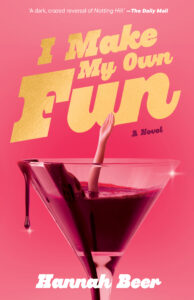I suppose, if I were to try to neatly sum up my novel in two quotes, I’d turn to Almost Famous and Gwyneth Paltrow. For the former, I’d choose this, said by Philip Seymour Hoffman’s character about rock stars: “friendship is the booze they feed you. They want you to get drunk on feeling like you belong”. And for the latter, I’d go with something Gwyneth said about the nineties on a late-night talk show: “it was great! I mean, talk about doing cocaine and not getting caught!”.
At the centre of I Make My Own Fun is a famous actress, Marina, the PR machines that prop her up, and the public-image-booze she feeds the rest of the world so that she can do whatever she wants without getting caught—regardless of who may get hurt in the process. The idea came to me after decades of observing celebrity culture and trying to figure out what I thought about it. You see, as far back as I can remember, I always wanted to read about famous people*. I remember accompanying my mother to our local supermarket as a small child, begging her to let me linger by the magazines at the front so I could soak up all the glamorous, exciting things that were happening in Hollywood while she did the weekly shop. It felt unfathomable to me, as a child in suburban England, that these people, with their designer clothes and enormous houses in perennially-sunny California actually existed.
I learned a lot from those supermarket reads. For example, when I was ten, you couldn’t get more famous than Britney, Linsday and Paris: from Toxic-inspired dance routines the world over, to Paris dubbing the selfie “the autograph of the 21st century” on The OC, via Lindsay Lohan’s iconic turn as everyone’s favorite mean girl, these women were golden in 2004. And yet, by 2007, all three had been pushed, quite spectacularly, from their perch atop the pop culture hills. The tabloids, nascent gossip blogs, and, of course, the general public, had joined forces to declare that there was a right way of being a famous woman and these three were falling short of it, by some margin. The message I received as a thirteen-year-old was clear: public favour was a precarious thing, something that could be snatched away just as quickly as it was given. Naturally, as young people do with received wisdom, I questioned this narrative as I grew older and more aware of the patriarchal structures that it was built on—but the idea that there was a cost of fame stayed with me, as did the question of the lengths people go to hold onto it.
All this to say, I’ve been observing celebrity culture a long time. I’ve watched with a borderline morbid curiosity how we put certain people on pedestals, the tools we use to keep them there or tear them down, and the games those people play themselves to outrun the tearing. I’ve also seen it change from the overtly viperous days of the early 00s to the hotbed of virtue signaling and sanctified smoke-and-mirrors that it has become since Instagram took its place in the PR machine. And although it was those early years that got me hooked on celebrity gossip, it was the advent of social media that sharpened my critical eye.
Social media gave celebrities, for the first time, a direct line to the general public and full control over what they communicated to us. Stars like Beyoncé and Taylor Swift started to give fewer and fewer interviews, preferring instead to announce album rollouts or major life updates on their own personal pages, often with the comments off. It gave celebrities—and their teams—a chance to show us all what they were really like, away from paparazzi and attention-grabbing headlines. Inevitably, the people celebrities present as on Instagram are always beacons of goodness and, crucially, just like us: baking cookies for their friends, volunteering in hospitals, advocating for adopting animals rather than shopping.
It was in the pandemic that I really started to scrutinize the booze we were being fed by celebrity PR machines. The differences between famous people and the rest of us became impossible to ignore, despite all best efforts to the contrary: Kim Kardashian, for example, flew all her friends to a private island to celebrate her 40th birthday while the rest of us stayed inside. And a slew of famous people, for some reason, released a video of them all singing Imagine by John Lennon a capella, each word echoing as it bounced off the walls of their cavernous living rooms. In both cases, that projection of goodness was still there—Kim took great pains to tell us all that everyone was quarantined for days before they boarded her private plane, and the Imagine video was apparently intended as a “statement of solidarity”. But even so, the mask, as they say, was off.
As I ruminated on these public displays of virtue, I kept coming back to that question of the cost of fame and how and why people hold onto it. As any active social media user will know, it’s fertile ground for deception even for the non-famous, and I couldn’t stop thinking about how the versions of famous people we see are only projections, carefully curated by teams of people in a bid to curry favor. The parasocial nature of fame is that we never really know who these people are, despite seeing their faces almost every day, and I started to wonder what it would be like if the gap between the projected person and the real person was more like a chasm. And if that were true, what might someone be able to get away with if they had a picture-perfect persona? How far might someone go to stay on top?
At the same time, I began to re-examine my own role—as a consumer of celebrity media and a died-in-the-wool fangirl of my favourite bands and pop stars—in upholding those projected images. Holding those two things in mind is what led me to Marina in I Make My Own Fun. I wanted to attempt to unpick the systems that keep someone’s perfect image intact (social media, PR, and fans), and to imagine someone who was stratospherically famous, universally beloved, but an absolute monster in private. What would a woman who has everything do to entertain herself? And more than that, once you have everything, what—or who—are you willing to sacrifice to maintain it?
The book is satire, but the funny thing is that when researching, I found no shortage of famous men who had done all sorts of wild and questionable things to keep themselves entertained: build rollercoasters in their back gardens, keep tigers as pets, dress up in offensive outfits at parties they believe they won’t be photographed at. And we all know how many powerful, famous men have behaved badly, sometimes for years, with limited to zero repercussions. As we saw with Paris, Britney, Lindsay and countless famous women since, the game is different for women, and so I knew that for my protagonist there had to be at least a vague threat of it all coming crashing down (or, to paraphrase Gwyneth: of getting caught). In I Make My Own Fun, Marina believes (just as I did as an impressionable teen) that there is a right line to tread as a famous woman, and if she just plays the game right she’ll be able to hold onto her celebrity for as long as she likes.
I think I’ll always be figuring out what I feel about celebrity culture. For one thing, it’s everchanging: the routes to fame and the qualities of star power are different from even when I first started writing. For another, I’m still a fangirl at heart, and that childlike impulse to escape into glamorous worlds far from my own does still rear its head every now and then. But one thing I can say with certainty is that gossip, fame, power and parasocialism make good thriller material, and I can’t ask for much more than that.
*I apologize to all Scorcese fans for butchering this line, but I sort of had to.
***
Previous Article



